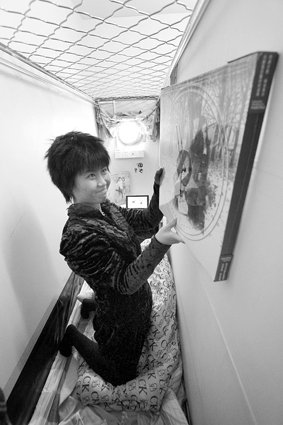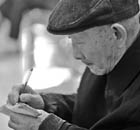Society
Beijing 'capsule room' has first tenant
By Zuo Likun (chinadaily.com.cn)
Updated: 2010-04-09 10:16
 |
Large Medium Small |
|
 Zhang Qi puts up a painting in her new capsule room in Beijing. [Legal Evening News]
|
For rent: a single bunk with a small bedside stand, squeezed between white-washed pasteboard walls with a wire mesh overhead, no window or washing room, not even any standing room. For less than 250 yuan ($37) per month, 25-year-old Zhang Qi moved in as its first tenant.
The bunk-style room is a housing experiment by retired engineer Huang Rixin, 78, who last month built his in-house apartments for lease in Liulangzhuang village of Haidian District, off the northwest corner of Beijing's Fourth Ring Road, Thursday's Legal Evening News reported.
The idea was so unconventional that Huang had to woo his tenants by offering a free trial live-in. Scores came to have a try; but Zhang was the only one who stayed.
Zhang, with a clean face and short hair, has been working in Beijing for five years and is now employed by an advertising firm in southeast Beijing's Guangqumen, earning about 3,000 to 4,000 yuan ($440 to $586) per month. Her workplace is almost 11 miles (18 kilometers) away from her rental house.
However, Zhang is not exactly homeless. Two years ago, assisted by her mother, Zhang bought a small apartment in Shuangjing near southeast Beijing's CBD, which is less than a mile from her workplace. The 20-square-meter apartment's value has shot up 70 percent, to 220,000 yuan ($32,230), and is now being leased out, earning her 1,200 yuan ($176) every month.
The newspaper didn't explain why Zhang decided to move to her rental room, in which she wasn't "quite conformable on the first day." The pasteboard is a lousy shield against noise, she said.
"I didn't bring along enough bedding and barely slept in the cold," she added.
"But it's OK when you get used to it." She decorated her new nest with colorful wallpaper, saying she wasn't shy about asking her friends to come around when everything was settled. She planned to locate there for up to a year, and "if possible, would stay even until getting married".
But the only problem was the lack of a wash room, for which she had to walk down from her third floor and use a public toilet. Showering, too, had to be in the nearby bath house.
Farmer-turned-migrant workers living in the vicinity marveled at the young tenant. "Even we don't want to live there," said one.
While house-owner Huang was happier: "The coming of a new tenant demonstrates that my design has been recognized."
According to Zhang's interview with the newspaper, her father passed away in 2008, leaving her a jobless mother and college sister, who just graduated this year. She didn't speak a word about her new living place to either of her family members.
"I don't think it's necessary to tell the family all about the hustle and bustle in one's life," Zhang said.







